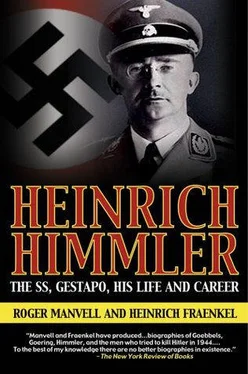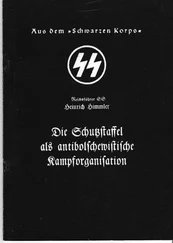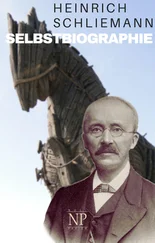Heydrich took his dismissal very badly. He wept, the only time he ever did so in Lina’s presence. He could think of no future for himself outside the services. But Lina von Osten had other ideas. She was a passionate Nazi, whose conversion had started when at the age of sixteen she had first heard Hitler speak at a meeting in Kiel. She knew all about the S.S., and believed that in this movement there should be a place for so talented and handsome an officer as her unemployed lover. He responded to her enthusiasm and joined the Party, and it was her resolution that eventually persuaded him to make the contact with Eberstein that led to his visit to Himmler in June. 5
Himmler, though in many respects a weak man, was nevertheless astute and calculating. Throughout his career as head of the S.S. he surrounded himself with men who in one way or another compensated for whatever was lacking in his own nature, while at the same time ensuring that they remained his servants. He used their strength, their brutality, or their intelligence to fulfil his purpose for him in whatever portion of his total plan it suited him to place them. Since, unlike Goring or Goebbels, he preferred to hover in the background out of the public eye, except on those formal occasions when it was necessary for him to be seen alongside the other leaders, he was not averse to letting his subordinates act as his agents while he kept out of sight, the spider silently operating at the centre of his web. But in Heydrich Himmler met a man who became his match. Heydrich was quick to realize the intentions of the Reichsführer S.S. and to exploit them for his own purposes, while carefully posing in his presence and that of others as a dutiful subordinate. Yet a kind of dubious, mutual respect existed between the two men which amounted in Himmler’s case to a form of affection; they shared the same negative ideals, though in nature and temperament they could not have been more diverse. For the next ten years, however, they were to be bound together, each man the other’s evil genius, until Heydrich’s assassination in 1942 suddenly removed him at a time when, in the estimation of many who knew him well, he was preparing to supersede Himmler and even outbid Hitler for power during this final period, for the Führer’s leadership was undermined by his own obsessions and threatened by the intrigues of his subordinates.
In June 1931, at the age of twenty-seven, Heydrich gladly accepted this minor post in the S.S. in which an increasing number of men of officer rank and even of aristocratic background were enlisting. He took up his duties in Munich officially on 10 August, and by Christmas had been promoted to the rank of a major in the S.S. At the same time, on 26 December, he married his resolute fiancée Lina von Osten, who was then only twenty years old. Major Heydrich’s salary was RM 180 a month, or about £15, 6and from the start he began the patient and methodical compilation of secret information on the private lives of men and women inside and, when it was likely to prove useful, outside the Party as well. By the end of the year he had assembled a small staff of helpers, and in 1932 (during a period of which, April to July, the S.A. and S.S. organizations were, officially at least, disbanded by the German government), Himmler used Heydrich’s skill and experience to help him reorganize the whole movement. In the summer Heydrich was promoted a colonel and given the title of Chief of the Sicherheitsdienst, but by then his influence was spread throughout the service, and he founded for Himmler an S.S. Junkerschule, 7an elite leadership school at Bad-Toelz in Upper Bavaria.
By now the S.S. was a substantial force. Although the original 280 men whom Himmler found under him in January 1929 had increased by January 1931 to only 400 enlisted members, supplemented by some 1,500 part-time recruits, there were by the time the Brüning government disbanded the S.A. and the S.S. in April 1932 as many as 30,000 S.S. men. The organization, however, still remained nominally a part of the S.A.
With the rapid growth of the S.S., a more comprehensive form of para-military organization had to be devised. In this Himmler sought the advice of Heydrich who, in addition to his organization of the S.D., became in effect Himmler’s Chief of Staff in the development of the S.S. as a whole, which was spread in units throughout Germany. Officers in certain centres such as Berlin, where Daluege controlled the S.S., acted with complete independence, and paid little or no attention to headquarters in Munich. The S.S. was now subjected to specialist departments for administration, training and discipline; among them was Heydrich’s unit which, while claiming to be the intelligence section, was in fact a highly organized spy-ring with an increasing network of carefully graded agents and informers. A filing system was devised so that every useful detail about the public and private lives of every individual working for or against the Party, whether he was inside or outside it, was recorded, more especially if the information was of such a nature that it could at any time in the future be extracted and used as a weapon against him. The ultimate strength of Himmler and Heydrich came very much to depend on the fear the existence of these files generated once it became known that they were the closely-guarded possession of the S.D. Heydrich modelled his department on what he regarded as the British spy system, which he held to be the most efficient in the world.
The year 1932 was a period of difficulty and dissension for the Party. Hitler’s instinctive sense of caution and self-protection led him to counterbalance the growing powers of his subordinates by creating for them overlapping functions, so that they expended their excess energies in the exercise of mutual distrust, and were to a considerable extent neutralized through their own intrigue. He encouraged the development of the S.S. not only because it provided the movement with a superior, class-conscious force that encouraged former officers and men of the upper class to join its ranks, but also because the rapid increase of its numbers helped to counterbalance the unruly private army of the S.A. This numbered by 1930 some 100,000 men, drawn mostly from the unemployed, and it was giving Hitler considerable trouble at the very time when he needed the support of the right-wing politicians and industrialists.
The ‘left’ and ‘right’ wings of the Party were in a state of open dissension, and in September 1930, the month of the elections in which the Party hoped to win many more seats in the Reichstag, the S.A. went so far as to storm the Party offices in Berlin so as to give an open demonstration of their anger when Otto Strasser, the man they regarded as their champion, was dismissed from the Party. He and Stennes were embarrassing Hitler’s attempts to win support from the Right. Only firm action by Hitler had stopped a catastrophe: to placate these unruly men he made himself Commander of the S.A. Exploiting the crisis of the unemployed, the Nazis won a substantial victory at the polls which entitled them to 107 seats in the Reichstag. It was then, in January 1931, that Hitler called on his old supporter Roehm, who had been working as a military instructor in Bolivia, to return to Germany and become Chief of Staff of the S.A. This appointment introduced a new, intrusive figure into the private world of Himmler and Heydrich. Roehm, a professional soldier, able and ambitious, imposed a new discipline on the S.A., of which the S.S. remained a part, while at the same time he entered into the round of political intrigue of which Goring was the principal agent and Goebbels the propagandist. The fact that Roehm was a notorious homosexual was to prove invaluable for Heydrich’s files, but in the meantime it became obvious that Himmler’s position in the Party and his relationship to Hitler and the other leaders must be more clearly worked out. 8
Читать дальше











